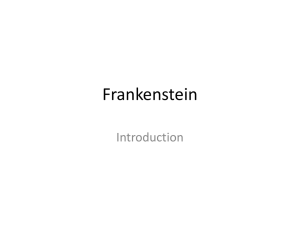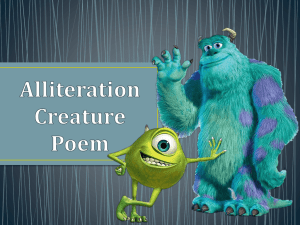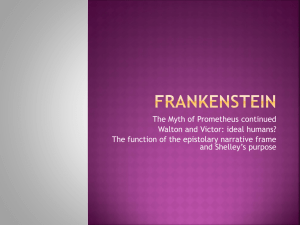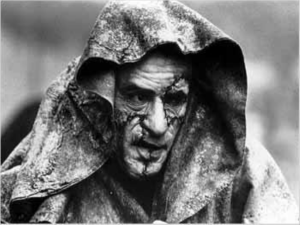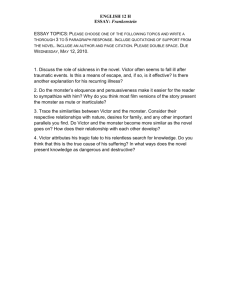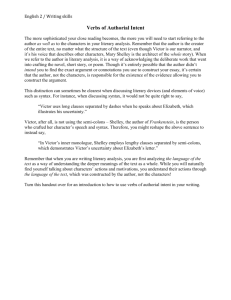Frankenstein Study Questions 135points possible You are to answer
advertisement
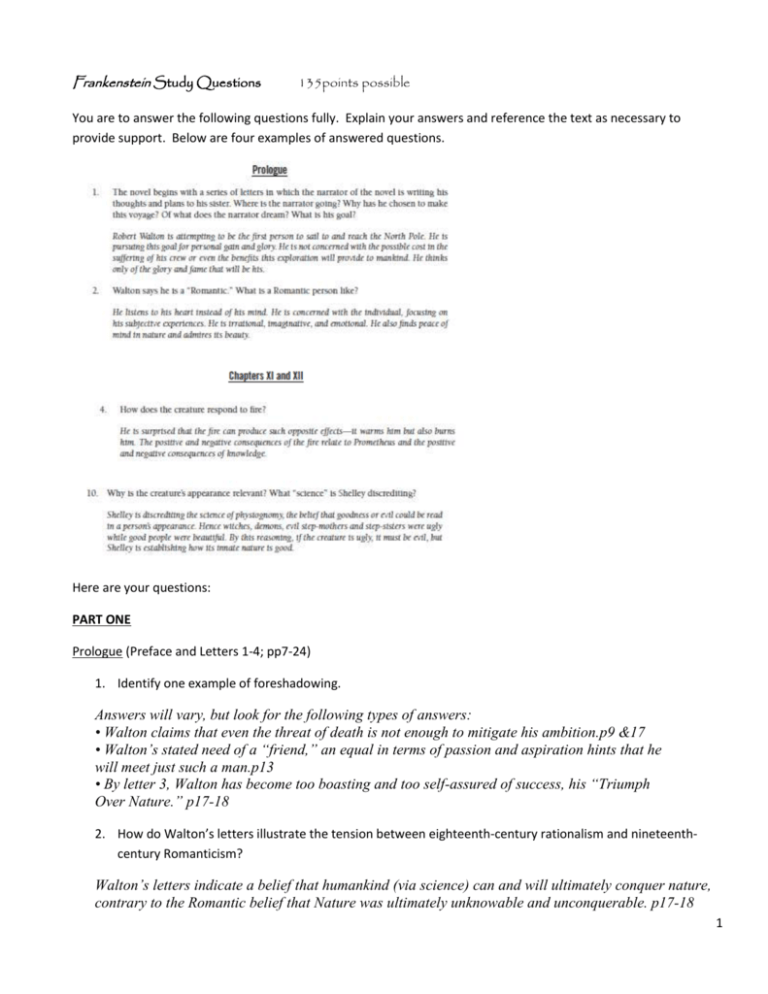
Frankenstein Study Questions 135points possible You are to answer the following questions fully. Explain your answers and reference the text as necessary to provide support. Below are four examples of answered questions. Here are your questions: PART ONE Prologue (Preface and Letters 1-4; pp7-24) 1. Identify one example of foreshadowing. Answers will vary, but look for the following types of answers: • Walton claims that even the threat of death is not enough to mitigate his ambition.p9 &17 • Walton’s stated need of a “friend,” an equal in terms of passion and aspiration hints that he will meet just such a man.p13 • By letter 3, Walton has become too boasting and too self-assured of success, his “Triumph Over Nature.” p17-18 2. How do Walton’s letters illustrate the tension between eighteenth-century rationalism and nineteenthcentury Romanticism? Walton’s letters indicate a belief that humankind (via science) can and will ultimately conquer nature, contrary to the Romantic belief that Nature was ultimately unknowable and unconquerable. p17-18 1 3. How does Frankenstein react to Walton’s dream/goal? He is horrified by Walton’s goal because he sees himself in Walton. He fears Walton is doomed to make the same tragic mistakes he has made. He fears for Walton’s safety and the crew’s lives.p22 4. Why does Frankenstein decide to tell Walton his story? He is trying to keep Walton from falling into the same trap he fell into with the pursuit of knowledge.p22-23 Chapters I and II (pp25-33) 5. What plot exposition does Shelley offer the reader in these chapters? Shelley provides the reader with the account of Frankenstein’s birth and early life, the backgrounds of his parents, how Elizabeth came into the family, etc. 6. What quality in young Frankenstein proves to be his tragic flaw later in life? His “passions were vehement.” He loved learning, and pursued that end with ferocity.p30-31 7. How is Elizabeth a “typical” Romantic female character? She is blonde and fair—the only one in her “family,” as she is Italian. She is also sweet, virtuous, and kind.p27-28 8. What is foreshadowed at the end of Chapter II? Victor suggests that his switch from the study of natural philosophy to the study of mathematics will turn out to be merely a temporary change, and the change back to natural philosophy will lead to Victor’s ultimate destruction.p33 Chapters III and IV (pp35-45) 9. How is the story of Victor’s mother’s death ironic? Victor’s mother contracts the disease that kills her by caring for, and eventually saving, Elizabeth.p35 10. Compare the physiognomy of Krempe and Waldman. Krempe is opinionated and intolerant. He is also extremely ugly. His physical appearance repulses Victor as does his attitude. Waldman is more open-minded and able to reconcile the ideas of the past with those of the future. He is also dashing-looking—not traditionally handsome, but handsome in a Byronic hero sort of way.p38 11. What is the literary term for M. Waldman and the effect that his lecture and guidance have on Victor? He is a catalyst.p39-40 2 12. What traditional tragic flaw is Victor demonstrating? Hubris “too much exalted by my first success to permit me to doubt of my ability” p43 13. What is the central flaw in Victor’s decision what to create? He believes he is creating a new life form when he is in reality merely imitating what has already been created.p44 14. What internal conflict does Victor deal with as he finishes his creation? He is both repelled and obsessed by it.p45 15. List some gothic details from the end of Chapter IV. Victor’s ill health—pale skin, emaciated frame, bulging eyes • The visits to charnel houses • The isolation of the top-floor laboratory p44-45 Chapters V and VI (pp 47-58) 16. How is the night that the creature is born an example of Gothic prose? It is dark and raining. The candle is nearly burned out. Overall, it is a very creepy setting.p47 17. What is ironic about the creature’s physical appearance? Victor says he selected the features to be beautiful, but the composite effect is grotesque.p47 18. What is Romantic about the creature’s physical appearance? The creature’s very grotesqueness is Romantic. Additionally, his flowing black hair and pearl white teeth make the creature resemble—like M. Waldman—the Byronic hero.p47 19. How does Dr. Frankenstein feel about his creation? What does he do after the creature comes to life? Breathless horror and disgust fill his heart when he sees his creature. He runs from the room.p47 20. What event is foreshadowed in the beginning of Chapter V? Frankenstein has a dream about Elizabeth’s death.p48 Chapters VII and VIII (pp 59-73) 21. What function do letters serve in this and previous chapters? Letters are the vehicles by which the first-person-character narrator can relate information that he himself has not witnessed and has no other way of knowing. 22. What is “gothic” about Frankenstein’s encounter with the creature? It is a dark, stormy, and suddenly violent night. The thunder ends when the creature disappears up the mountain.p47-48 & 62-63 3 23. Do you think Frankenstein is as guilty as he feels he is? Of what do you think he is guilty, if anything? Answers may vary. One possibility is that he is guilty of William’s murder because he created the monster. Victor has chosen to remain silent about his creation instead of freeing Justine from the accusation; therefore, he is also guilty of what happens to Justine.p63 &67 24. How do the reactions of Victor and his family to William’s murder illustrate Romantic principles? All of their emotional responses are overly-intense as the Romantics fancied themselves preternaturally aware of sensory and emotional experience.p59-65 PART TWO Chapters IX and X (pp75-85) 25. How does Victor become a disenfranchised member of society himself? Because everyone believed the young girl was guilty and treated her so horribly, he can no longer see the world, and people, as he once did. p77 26. What are Victor’s feelings as his creature approaches him. What is the first thing he says to his creature? He feels rage and horror. “Devil, do you dare approach me?” p83 “I trembled with rage and horror.” 27. How does the creature respond to Victor? He says, “How dare you sport thus with life?” This quotation refers to the idea of creating and destroying life as if it were a sport. The monster shows itself to be more humane than Victor, valuing life more than his creator. p83 28. What biblical character does the creature compare himself to? What character does he think he ought to be? He compares himself to a fallen angel—a reference to Satan. He feels he should be like Adam— adored by his creator. p84 29. What does the creature say made him a “fiend?” What is Romantic about this? He says misery made him a fiend. Romantics believed that people were essentially good and that evil was introduced into the world by social mistreatment. p84 Chapters XI and XII (pp 87-97) 30. Trace the levels of narration Shelley has established to tell this story. The creature is telling his story to Victor, who is telling the story to Walton, who is writing the story in a letter to his sister. 31. What effect does the creature’s speech (vocabulary and grammar) have on the reader? Why did Shelley write it for that purpose? 4 His speech makes him civilized, even human. Shelley made him speak like that to increase reader sympathy for the creature. 32. Why does the creature work so hard to learn the cottagers’ language? What does that reveal about his character? He hopes that his ability to speak, will enable the cottagers to look past his appearance. It shows that he greatly wants a human connection. 33. What evidence does Shelley provide of the creature’s innate goodness? The creature instinctively likes the cottagers and is moved by their shows of apparent sorrow. Once he recognizes that their lives are a struggle, he performs tasks for them to make their lives a little easier.p94 34. What is typically Romantic in the final paragraph of Chapter XII? The fact that his spirits were uplifted by the beautiful spring is very Romantic. 35. How are the creature’s first words similar to the typical first words of human babies? A baby’s first words are nounsnames of concrete things. Chapters XIII and XIV (pp 99-108) 36. What paradox does the creature see in humankind through his study of human history? He sees that man can be so “powerful, so virtuous, and magnificent” while being so “vicious and base.” p101 37. In what way does his study of human society make him what he eventually becomes? He learns a lot about murder and evil by studying society; otherwise he never would have known how to “murder.” 38. In view of the trial of Safie’s father in Chapter XIV, and Justine’s trial earlier, what is Shelley’s opinion of the courts in that era? Shelley thought that they were corrupt and convicted people on very circumstantial evidence. 39. How is Safie a feminist character? She defies her father by going to Germany instead of going home. She is independent. By marrying a Christian, she escapes life in a harem. 40. What is the character of Safie’s father? How is he a foil to Safie, and to Victor’s own father? Safie’s father is an opportunistic and old-fashioned Muslim who has no respect for women. Safie is an enlightened female, and Victor’s father values women as people and truly loves his wife and adopted daughter. Chapters XV and XVI (pp 109-123) 5 41. What is the creature’s reaction to Paradise Lost? According to the creature, how is he both similar to and dissimilar from Adam? Like Adam, he has disappointed his creator. Unlike Adam, he was not created by God, has no partner, and is unhappy with his existence. 42. What evidence is there that the creature is still essentially good despite the disappointment he suffers from the cottagers’ rejection of him? He admits that his anger was so great he could have burned down the cottage and killed the inhabitants, enjoying their screams of anguish, but he does not. Instead, he devises a new plan to befriend them.p115 Chapters XVII and XVIII (pp 125-134) 43. What, according to the creature, is the cause of his wickedness and what will be the remedy? The creature’s loneliness and isolation are the causes of its wickedness. When it has the mate, it will be happy, good, and together they will leave humankind alone. 44. Follow Victor’s and the creature’s lines of reasoning in their debate over the creation of the companion. Whose reasoning is most sound? p125-6 Victor’s line of reasoning is that the creature has already shown itself to be evil, and he therefore does not trust it to keep its word. The creature insists that it is good by nature and that the hatred and misery to which it has been subjected have made it evil. When given the chance for happiness, its good nature will once again surface. Answers will vary, but at this point it is most likely that Shelley wants the reader’s sympathy to lie with the creature. 45. Why does Victor refuse to make a female monster? Do you feel he is justified in his refusal? He refuses to make a female because he is afraid that the two creatures (and potentially their offspring) would destroy the world. Answers will vary in regard to his justification. 46. What is different about Victor’s solitude at the beginning of Chapter XVIII from his solitude while first creating the monster? The solitude he seeks now is calming and natural. When he was creating the monster, his solitude was in his attic with his instruments. This time he is postponing his task, while before he was working fanatically at it. This time he is sadder and more fearful. PART THREE Chapters XIX and XX (pp 135-147) 47. Why would the Romantic Mary Shelley call the English Civil War “the most animating epoch of English history”? 6 As a “liberal,” Shelley would have been excited by the thought of common subjects and their elected Parliament rising up against a tyrannical king, deposing him, and abolishing the monarchy. 48. What style of literature describes the place where Victor begins to work in Scotland? Why? Gothic. It is desolate and forbidding landscape to mirror the horrible task he must complete. 49. Give four reasons why Victor changes his mind about making the second creature. Use evidence from the book to refute each of Victor’s reasons (cite page numbers). a. The female creature might be more evil than the first. a. The romantics believed in the concept of Tabula Rasa – that a person was born a “blank” slate with no innate personality. Personality was formed by a person’s upbringing, education, and experiences. This is evident in the creature’s account of its own “growing up.” b. She has made no promise to live an isolated life. c. She might reject the first creature and then there would be two wild ones. b and c. The creature “awoke” to no one – no companion, no teacher, mentor, or guide to help him form his opinions and values. The female would have the creature to help her form her thoughts and feelings. d. Worse yet, they might propagate a new race. d. They might, but there is no reason to believe that their offspring won’t be born with the same nature as the parents. Also, if Victor is truly afraid of this, he could take some responsibility as a creator. Finally, he could ensure the female in incapable of reproduction. 50. What opinion does Victor have of his creation? Do you agree with his assessment of it? He believes his creature is a wicked demon. Opinions may vary about his evaluation. One possibility is that the creature has been made wicked by society. The creature was made an outcast because of his appearance and only sought after friendship. Chapters XXI and XXII (pp 149-163) 51. Why does Victor think he survived all that he had been through? How is the fact that he lives ironic? He thinks he is doomed to live. While all of his friends must die, which is usually considered the worst possible thing, he remains alive. IRONY – In his case, watching everything he loves being destroyed is worse than death. 7 52. What does the word “torpor” mean in the following context?: “But my general state of being was a torpor, in which a prison was as welcome a residence as the divinest scene in nature”? apathy, listlessness, dullness 53. What is ironic about the desires of Victor and the creature? Victor can have human companionship, but doesn’t want it. The creature longs for companionship, and is forever denied it. 54. How does Shelley build suspense in these chapters? Shelley delays revealing who the murder victim is while offering clues that the murderer is the creature and the victim might be Clerval. Victor seems to condemn himself in his reaction to seeing Clerval’s body and in his feverish rantings. He continues to misinterpret the creature’s threat to be with him on his wedding night, and actually advances the date of the wedding. 55. What evidence is there to suggest what the creature really means by his threat to be with Frankenstein on his wedding night? The creature desires companionship. That has been his sole issue since the day of his coming to life. Victor has denied him that companionship – even to the extent of destroying the female companion. Therefore, the creature will do all he can to deprive Victor of companionship – even to the extent of destroying Victor’s “female companion” (i.e. Elizabeth) Chapters XXIII and XXIV (pp 165-186) 56. What does the word “acme” mean in the following context: Mine has been a tale of horrors; I have reached their acme, and what I must now relate can but be tedious to you”? climax, summit 57. Victor, in is anger, says to the magistrate, “How ignorant art thou in thy pride of wisdom.” What is the irony in this? It is Victor’s pride and wisdom that led him to create the monster. 58. What does the creature want Victor to do now? (Chapter XXIV) How does that show a difference in the creature’s character from when he wanted a companion? 8 He wants Victor to live. Life without all he once held dear is more painful to Victor than death would be, and the creature wants him to feel that pain. Before, the creature only wanted Victor to make him a companion. Now he wants Victor to suffer, which shows he truly has turned revengeful and possibly evil. 59. Consider Victor’s statement: “When I reflected on the work I had completed, no less a one than the creation of a sensitive and rational animal, I could not rank myself with the herd or common projectors…All my speculations and hopes are as nothing; and, like the archangel who aspired to omnipotence, I am chained to eternal hell.” How does this establish Victor as a tragic hero? Victor began his research into the mystery of life with good intentions, and envisioned himself something like a God. Now, however, he realizes that he is much more like the Satan of Paradise Lost – having challenged the omnipotence of God and finding himself cast into Hell. 60. On his deathbed, Victor admits that he had an obligation to make sure his creature had a happy life. What is ironic about the excuse he offers for not doing so? He says that his paramount obligation was to see to the welfare of his fellow humans, which is a concern he should have considered before embarking on his endeavor. 61. How does the end of the novel justify the concentric levels of narration introduced at the beginning? Victor, the first-person character narrator, cannot narrate his own death. Therefore, Shelley needs to invent a means of including this event in her narrative – hence Captain Walton and his letters to his sister. 62. How does the inclusion of Captain Walton affect the overall meaning of the book? Walton, like Victor, is a man obsessed with a grand aspiration. His story parallels Frankenstein’s except that he is able to learn from Frankenstein. Walton’s decision to abort his mission and return home establishes the theme of the failed Romanic quest. 63. Explain how Victor is similar to a tragic hero. He is of noble birth, and has noble aspirations. He thinks and feels intensely. He has passionate aspirations and exhibits hubris The actions that result in his downfall and death are intended for good, but he does not clearly consider or understand their true consequences He feels intense suffering during his downfall. Despite his noble character, he has a blind spot that allows him to commit errors in both action and judgment His errors, and the resultant suffering, spread to those around him He dies as a result of his actions (looses everything) 9 64. Explain how Victor is similar to a romantic hero. Answers will vary, but should show both an understanding of the hero type and of the book. He is an individual of high birth with stronger-than-normal passions He has a deep appreciation of the rugged beauty of nature and finds both relief and inspirations in the mountains and lakes of Switzerland He feels deeply. When he is happy he is intensely, extra-humanly happy. When he grieves, his is an intense, extra-human grief He has an aspiration considerably beyond the scope of normal human aspiration – striving actually to be Godlike He ultimately fails in this quest, but dies a “sadder but wiser” man 65. How does Victor depart from the typical tragic hero? He departs from the form of the typical Romantic Hero in that he discourages other extra-human endeavors, encouraging Walton to return home to a “normal” life and avoid disillusionment and ruin. 10
